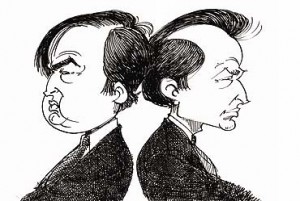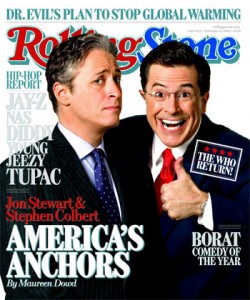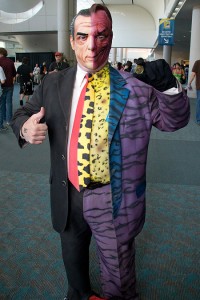There are some good things about the collective hive-mind that is the internet meme and many a waste-of-time. Richard Dawkins & hallucinatory visuals better become one.
Richard Dawkins on Gen Connected


The Thoughts Within
My take on the world of Media & Marketing, it’s shortfalls, its high points and the often shallow, and sometimes great, people who work in it.
There are some good things about the collective hive-mind that is the internet meme and many a waste-of-time. Richard Dawkins & hallucinatory visuals better become one.
Richard Dawkins on Gen Connected

Being an Adman myself, I can understand Banksy’s ire at the profession.
It can at times be a hollow one filled with it’s fair share of insecure individuals who are over-compensating for that insecurity with imaginary renditions of beauty, society, family anything we aspire towards. Working in advertising you’re always told the one secret to success is flexible morals. Seems like a sad way to make a living!
Advertising makes creatives a tad bitter too, cause it’s perhaps one of the few creative arts where the creator is not free to do as he/she pleases. Rather they must take instructions and perform to someone else’s subjective preferences i.e. The Client.
Artists, Musicians, Film Makers have the majority of creative control and final say on their work. In advertising that final control lies with the client and as you can imagine it breeds frustration and resentment.
In advertising’s defense though, I think banksy is giving it too much credit for influencing the public at large’s perceptions. IMHO there is a backlash to advertising and it’s messages. We have or are soon reaching a point where advertising messages are droned out and no longer the influencers they once were. Societal norms are changing and admen are no longer defining them but chasing them.
The credibility of advertisers has taken quite a beating in this media messaged generation, nothing a brand puts out is taken as gospel. In fact it is put to intense scrutiny and suspicion cause consumers are savvy enough to realize that a brand’s not paying for (media) messages that do not serve it’s purpose. Dove never ran a negative testimonial, Car companies never publicize their failures, FMCG companies don’t talk about the health hazards.
But now they all are – Coke has an ad that speaks about it’s initiative to control diabetes in America, McDonalds wants to answer questions about its food, Dove wants women to be themselves, the list is long and Hooray for that!
Slowly but steadily; What goes around comes around. Neon – The flag bearer of the 80’s is here once again.
Since fashion and trends do in some manner signify the general mood of the times. Is there something that drives a style to make a come back at this moment in time? If the popularity of colors can be interpreted as a reflection of the prevalent mood and times let’s hope Neon colors signify a more optimistic outlook for the future indicative of a recovering economy and a blindingly-brilliant-bright light at the end of the tunnel.
http://www.nytimes.com/slideshow/2013/04/29/fashion/streetstyleneon.html

Our first taste of bureaucracy and our most important piece of identification gets a much needed 21st Century make-over.
![]()
Daniel Craig has done a great job with becoming the new 21st Century Bond. It seems common sensical now to think that the Bond of yore would never have survived in the post-bourne era.
Bond had to become tougher and more action-packed, less focus on the suave and more on the martial arts and brawny parts in the movies.
The franchise recognized the need to update Bond. While Pierce Brosnan did justice to the suave facet of Bond he could never have convincingly been a lethal bond. In that role Daniel Craig has done a great job.

The Two Ambani brothers are among the 5 richest people in India, & in the top 10 around the world, a country of over 1 Billion.
Together the brothers are often monopolies in multiple sectors. From Petrochemicals (Reliance) to Energy distribution (ADAG), Pharmaceuticals (Reliance) to Hospitals (ADAG), SEZ’s (Special Economic Zones- Reliance) to Infrastructure (ADAG).
If one brother does petrochemicals the other does electricity, so literally the entire energy sector’s manufacture, delivery & pricing is controlled by them. This formulae plays out in multiple other related industries.
In any other country the judiciary would already have filed anti-trust & monopoly cases against the Ambani’s. But not in India, where the judiciary tends to do what the government says, and the government tends to be in bed with industrialists. But surely the WTO would have applied pressure in time.
So how did they get away with it? What did they do? They faked a break-up!
Anyone who’s seen Indian Movies knows that one of the most common story plots used is that of warring brothers. So why mess with a time tested formula. Using this as the storyline, the Ambani brothers managed to roll out the Perfect PR Decoy.
They started to war publicly in the media and presented the case, through they’re PR departments, that the differences between the brothers were irreconcilable. Hence each had to go his own way & the company needed to be broken into 2 entities which would be completely independent of each other. The brothers even had a tacit agreement on which industries each brother would rule. Mukesh got all the old established Industries and Anil got a boat load of money (which was quite generous for warring brothers) to start companies in new Industries that Mukesh & Reliance Industries were’t already in.
Doesn’t this sound absurd?
All of Anil’s experience was gained working in those very industries with his father, Ambani Senior. Why would he abandon all his learnings to work in a new industry.
Wouldn’t you think Anil Ambani would want to prove something by beating his brother Mukesh Ambani at his own game, on the same playing field, in the same Industries using his skills to prove that he is the better manager.
But perhaps they really wanted nothing to do with each other and move on for good. Let’s see how the story fares on further inspection.
In order to believe the Ambani’s story one has to believe that the brothers & more importantly their businesses are now 2 different entities and that there is no collusion between them or their companies.
The brothers still live together in the same house. Which Billionaire does that? They were so offended with each other that it was morally acceptable for them to split their beloved father’s businesses but obviously not offended enough to move into separate houses!
Reliance Industries (Mukesh Ambani) & ADAG (Anil Ambani) have been broken up for under 10 years but already they are in business together on Infrastructure, Mining & a few other heavy investment sectors. Who knows how many businesses they will be in by 2020, I fear as many as they can get away with.
Break-up the Monopoly.
 News today is a bit like a cough drop: The medicine (serious news content) has to be concealed within a sugary package (entertainment) in order for it to be consumed.
News today is a bit like a cough drop: The medicine (serious news content) has to be concealed within a sugary package (entertainment) in order for it to be consumed.
I’m not the greatest fan of Jon Stewart & Stephen Colbert’s new (for 2 yrs now since they got mass) theatrical style, but if a little silly entertainment helps the uninformed get informed then I can deal with it.
Only the upcoming US presidential elections and how well the misinformation is dispelled will show if it was worth it.

You’d think not at all, and you’d most likely be in the majority.
Both these professions have vastly different requirements/ambitions/practitioners as per common sense.
Politicians are supposed to be representatives of the people. They are mirrors that reflect the ideals and beliefs of their constituents in government. They are supposed to stand for all that is good or be voted out in the next polls.
Advertisers are marketers. Sellers of goods and services, at any cost. They are known to be hoodwink artists, small print practitioners and generally low moral individuals. Always ready to confuse and then place their brand as the solution.
Today, Age old Advertising tricks are being used in politics. Advertisers are considered the 2nd lowest profession for ethics (only used car salesmen beat them). So how can Politicians, who are answerable to the public, act like advertisers (false claims and the like) and get away with it?
By muddying the commonsense of an individual, by resorting to emotional tactics and ever more often to religion, creed, race and all that divides us as human.
When it comes to ads about a product we know to take it with a pinch of salt because the ad is made by and paid for by the company selling the product.Yet there seems to be no disconnect about trusting political ads paid for by the candidate they are endorsing.
Laws are now being passed that look like misleading ads, which say one thing then deliver another (tax breaks for the rich, laws that benefit companies not people etc). Almost as if advertising copy writers had written it themselves.
Advertisers are always trying to find a rtb (reason to believe) it could be a celebrity endorsement, or a testimonial (like dove ads where “regular” women vouch for the product and its claims). We are starting to see this same logic being used with the Joe the Plumber and Tea Partyers who claim to be “regular” people. They aren’t, they are paid for by the opposition. Just like the dove ladies are paid for by dove.
Another common advertising technique is the “Vs. The other leading brands”. These ads or dummy tests are always done under conditions favorable to benefit the brand paying for the advertising. Just like studies, statistics or research findings are exploited to further the political agendas of those paying for them.
When our purchasing decisions are made by advertising gimmicks why can’t our political decisions be influenced by the very same tactics.
Today advertising and politics are bedfellows. Consumers are voters and vice versa.
The reasons behind the death of advertising is very similar to the story of the boy who cried wolf one to many times.
Over the years bogus claims and the ample use of the * has made consumers have no faith in the marketing communication of companies.
Why should they trust any claim made in an ad that is paid for, made by and distributed with the companies funds?
It’s about time ad agencies realized this and became moral custodians of the products and the communication they use to advertise them. It’s important to tell a client when their claims are only marginally true and often misleading. Cause this will hurt the brand the most in the long run.
But sadly today ad agencies are seen more as vendors and not as partners.
This leads to a “shut-up and do it our way” mentality on the clients end and a “Do it or else the client will go to some agency that does” on the agencies end.
In all honesty both parties are guilty of focusing on short term gains at the expense of long term success. It is important for the client to understand this and it is the ad agencies duty to make them understand.
A marketing manager wants to change his job every 3-5 years. A brand wants to stay in business for much longer. If an agency desires a long term relationship with the brand, it must understand and communicate this conflict of interest.
A brand might move to PR, seen as significantly more believable, but an ad agency will cease to be an ad agency.